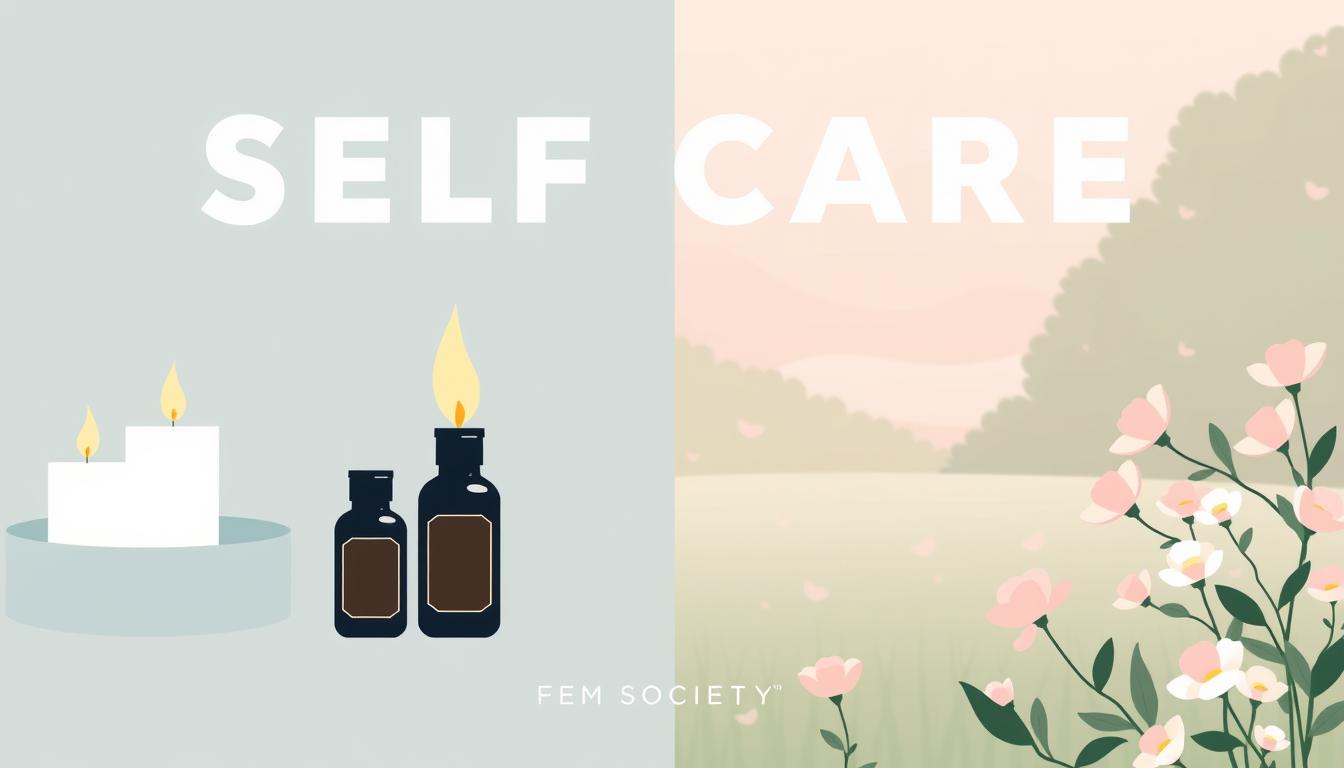Seven in 10 girls feel they’re not good enough, a Dove’s Self-Esteem Project report shows. This is why women need to focus on building self-confidence. Self-confidence is key to success, but many women find it hard to get.
If you face imposter syndrome or negative self-talk, this guide is for you. It offers strategies to boost your self-confidence. By the end, you’ll know how to be the confident person you want to be.

Key Takeaways
- Self-confidence is crucial for women’s well-being and success.
- Building and maintaining confidence requires active effort and belief in oneself.
- Overcoming common barriers, such as negative self-talk and social comparison, is key to developing self-confidence.
- Implementing daily habits, practicing self-compassion, and embracing authenticity can significantly boost confidence levels.
- Developing resilience, maintaining a growth mindset, and celebrating progress are essential for long-term confidence growth.
Understanding Self-Confidence and Its Impact on Women’s Lives

Self-confidence is very important for women. It helps them in their personal and work lives. It’s about knowing your worth and what you can do.
When women feel confident, it changes their lives. It helps in relationships, work, and feeling good about themselves.
The Psychology Behind Female Confidence
Confidence in women starts with loving who they are. Confident women take risks and go for their dreams. They also speak up for what they need.
This mindset makes them happy and successful in their careers.
Why Self-Confidence Matters for Women
Self-confidence is key for women who want to lead. It helps them face doubts and challenges. It lets them share their ideas well.
Being confident and skilled is vital for women to succeed at work. It helps them reach their goals.
Common Barriers to Self-Confidence
But, women often face things that make them doubt themselves. Things like what society expects, negative thoughts, and past failures. These can make them feel not good enough.
It’s important for women to break through these barriers. This way, they can feel good about themselves and be true to who they are.
“Confidence is not something that comes from the outside; it comes from the inside. It’s about believing in yourself and your abilities, no matter what obstacles you face.”
Knowing about female confidence and its value is the first step. It helps find ways to boost confidence and beat common doubts.
Identifying Root Causes of Low Self-Esteem in Women
Low self-esteem in women comes from many things. This includes childhood, society, and personal problems. Knowing why is key to fixing it. Let’s look at some main reasons.
Societal and Cultural Influences
What society expects from women affects their self-esteem a lot. Things like unrealistic beauty standards, diet culture, and gender-based violence make women feel bad. The push for a certain look can hurt their body image and confidence.
Childhood Experiences
How a woman was treated as a child is very important. Experiences of trauma, neglect, or lack of support can last a lifetime. Being criticized or not loved enough can make a woman doubt herself.
Negative Self-Talk and Rumination
Women with low self-esteem often talk badly to themselves. They always find fault and focus on flaws. This thinking is hard to stop and hurts their confidence.
Sociocultural Factors
Being treated unfairly by society also affects self-esteem. Cultural influences, systemic discrimination, and marginalization make women feel less valued. Racism, sexism, and other oppressions can make them doubt their worth.
Understanding why women have low self-esteem helps us help them. Fixing these problems is key to empowering women. It lets them reach their full potential.
How to Boost Self-Confidence as a Woman

Building self-confidence is a journey. With the right habits, positive talk, and kindness to yourself, you can reach your full potential. Let’s look at these powerful ways to build strong confidence.
Building Daily Confidence Habits
Being consistent is key to boosting self-confidence. Start your day with positive affirmations. Set goals you can reach and add self-care to your daily life. These habits can change how you see yourself and tackle challenges.
- Practice daily affirmations to counter negative self-talk
- Set realistic, measurable goals to foster a sense of accomplishment
- Establish a self-care routine that nurtures your mind, body, and soul
Creating Positive Self-Talk Patterns
Your inner talk greatly affects your confidence. Challenge negative thoughts with positive ones. This can help you beat self-doubt and feel more capable.
- Identify and replace negative self-talk with empowering statements
- Practice self-compassion by treating yourself with kindness and understanding
- Celebrate your successes, no matter how small, to build a positive mental framework
Developing Self-Compassion Practices
Self-compassion fights low self-confidence. Treat yourself with kindness, just like a dear friend. This way, you can face challenges better and grow with support.
“Self-confidence is a superpower. Once you start to believe in yourself, magic starts happening.” – Anonymous
By mixing daily habits, positive talk, and kindness, you can unlock your inner strength. Remember, confidence grows over time. Be patient and celebrate your journey.
Overcoming Self-Doubt and Negative Self-Talk

Beating self-doubt and negative thoughts is key to feeling good about yourself. Studies show that being kind to yourself helps a lot. It’s not easy, but it’s something you can work on every day.
Begin your day with positive affirmations. These words can make you feel strong and ready for anything. Also, write down things you’re thankful for. This helps you see the good in life and forget the bad.
It’s important to think about yourself often. This helps you see what you’re good at and what you can get better at. Don’t let failures make you believe you’re not good enough. Remember, growing is a long-term thing.
Having friends who support you can make a big difference. Be around people who make you feel good about yourself. You might want to join a group or find a mentor who believes in you.
Stay away from people who always say no. Instead, do things that make you feel good every day. Celebrate every little win. With effort and the right steps, you can feel more confident.
Building a Strong Foundation Through Self-Care

Starting to feel more confident as a woman begins with self-care. Taking care of your body, mind, and feelings helps build inner strength. This strength is key to doing well in life.
Physical Self-Care Practices
Looking after your body is key to confidence. Eat well, exercise often, and sleep well. These habits increase your energy and make you feel good about yourself.
Mental and Emotional Wellness
It’s also important to care for your mind and feelings. Try mindfulness like meditation or journaling. It helps you understand yourself better and handle stress. Getting help from a therapist can also help a lot.
Setting Healthy Boundaries
Setting good boundaries is crucial for confidence. Say “no” when it’s right for you. Surround yourself with people who support and lift you up. This shows you value yourself and boosts your confidence.
“Self-care is not self-indulgence, it is self-preservation.” – Audre Lorde
Self-care is the base for lasting confidence in women. By taking care of your body, mind, and feelings, and setting boundaries, you build a strong inner self. This self empowers you to face life’s challenges with ease and strength.
Developing Your Personal Style and Body Image

Your personal style and body image are key to feeling confident. Wearing clothes that show off your best features makes you feel good. It changes how you see yourself and how others see you too.
Research shows clothes can really affect how confident you feel. Wearing clothes that make you feel good can make you feel better about your body. It can even change how you eat and manage your time.
Finding a style that makes you feel confident is important. It helps you feel better about yourself and your life. Clothes can show others your strength and professionalism.
A study in the Journal of Experimental Social Psychology found that feeling powerful in clothes helps you do better. People who dress well are seen as more competent and trustworthy.
It’s important to love your body and not compare it to others. Focus on being healthy and accepting yourself. This helps you feel confident and true to yourself.
Working with a stylist or trying new things can really help. Your style shows who you are inside. So, let it shine and be proud of it.
| Key Benefits of Developing Personal Style | Impact on Confidence and Self-Esteem |
|---|---|
| Highlights your unique features Allows for self-expression Boosts self-perception and mindfulness Conveys strength, confidence, and professionalism Influences how you are perceived by others | Improves body image and self-acceptance Increases self-assurance and performance Promotes a positive self-image Enhances overall well-being and fulfillment |
Mastering Professional Confidence in the Workplace

Building professional confidence is key for women in their careers. It involves improving communication and leadership skills. These areas help you succeed in the workplace.
Communication Skills for Success
Good communication is the base of confidence at work. Work on being assertive and clear when speaking. A study shows 75% of women struggle to speak up at work.
Practice listening well, keep eye contact, and speak with confidence. This will help you share your ideas clearly.
Leadership Development Strategies
Look for mentors and keep learning to grow as a leader. Only 16% of top jobs in big companies are held by minorities, a study found. But you can still develop your skills.
Take on big tasks and show you can handle them. This proves your worth and skills.
Handling Workplace Challenges
Deal with challenges like feeling like an imposter and gender biases. About 20% of Black and 17% of Hispanic workers feel unsure at work. Having a strong support network helps.
Also, be kind to yourself. Remember, a good work environment boosts confidence and empowers teams.
Mastering confidence at work opens doors to success. Celebrate your strengths and keep growing.
Creating Strong Support Networks

As a woman, it’s key to build a strong support network. This helps boost your self-confidence and personal growth. Being around positive people who support your growth is very important.
Networking with confident women and joining support groups can help. These actions give you the emotional support and inspiration you need. They help you thrive.
Studies show that people with strong support networks feel more confident and happy. Doing regular exercise, practicing gratitude, and setting goals also helps. By focusing on your strengths and being yourself, you can make real connections.
- Find people in your life who uplift you and spend more time with them.
- Join a local or online support group for women to connect with others.
- Reconnect with old friends to strengthen your support network.
- Be clear about your needs and boundaries with your support network.
- Think about the balance and dynamics of your support network and make changes if needed.
Building a strong support network and caring for your relationships can unlock confidence and resilience. Let your support system help you reach new heights.
“Surround yourself with people who make you a better version of yourself.”
Embracing Your Authentic Self

True confidence grows when you accept who you are. Start by finding your personal values. These are the beliefs that guide your choices and shape your view of the world.
Think about what really matters to you. What gives you a sense of purpose and meaning?
It’s also important to celebrate what makes you different. We all have unique traits, talents, and experiences. Embrace what makes you special and let your light shine.
Studies show that feeling accepted for who you are boosts self-esteem and mental health.
Building Genuine Relationships
Being true to yourself makes it easier to form real connections. People like being around those who are genuine and honest. They prefer friends who are themselves, not just pretending to be someone else.
Authenticity leads to deeper, more meaningful relationships. It builds trust, allows for vulnerability, and creates emotional closeness.
The path to embracing your true self is a journey. It takes self-awareness, courage, and a willingness to challenge what others expect. But the benefits are huge – better well-being, stronger bonds, and a deep sense of self-confidence that shines from within.
“Authenticity is the daily practice of letting go of who we think we’re supposed to be and embracing who we are.” – Brené Brown
Breaking Free from Social Comparison

In today’s world, it’s easy to compare ourselves to others. Social media shows us perfect lives, making us feel bad about ourselves. But, it’s important to stop comparing to feel good about who we are.
First, we need to see how bad comparing is. Most people do it, and it makes them feel not good enough. It can make us jealous and unhappy.
To fight this, we should use social media less. Instead, focus on getting better ourselves. Being thankful for what we can do helps us not compare. 65% of people feel jealous when they compare. So, it’s good to accept ourselves and celebrate our own path.
- Recognize the harmful effects of social comparison
- Limit social media use and focus on your personal growth
- Practice gratitude for your unique strengths and accomplishments
- Challenge negative self-talk and replace it with positive affirmations
- Seek support from trusted friends and mentors who can provide a healthy perspective
Getting out of the comparison trap takes time and effort. We need to know ourselves, be kind to ourselves, and care for our own happiness. By focusing on being true to ourselves, we can feel confident and happy in the digital world.
| Key Statistic | Percentage |
|---|---|
| People who engage in social comparison | 80% |
| People who experience envy or jealousy when comparing themselves to others | 65% |
| People who feel their achievements are diminished when comparing to others | 70% |
| People who find it helpful to name their inner critic to reduce its power | 95% |
| People who report a boost in self-esteem when keeping a record of their achievements | 60% |
| People who find journaling and self-reflection effective for combating self-esteem issues | 85% |
“Breaking free from the comparison trap is an ongoing journey requiring self-awareness, self-compassion, and commitment to personal growth and well-being.”
Developing Resilience and Inner Strength

Women need to build resilience and inner strength. This helps them stay confident and face challenges. Learning to bounce back from setbacks is key.
Bouncing Back from Setbacks
Resilience means bouncing back from hard times. Women who are resilient see setbacks as chances to grow. They practice kindness to themselves and focus on what they can control.
Building Mental Toughness
Mental toughness helps you get through tough times. Embrace challenges to grow stronger. Mindfulness, setting goals, and celebrating small wins help build this toughness.
Learning from Challenges
Every challenge is a chance to learn and grow. Reflecting on your experiences helps you become stronger. This self-awareness helps you face future obstacles with determination.
Building resilience and inner strength is a journey. It makes you better at building resilience in women, mental toughness for confidence, and overcoming challenges. Embrace this journey, and your self-assurance will grow.
“Resilience is not about being unbreakable. It’s about bouncing back from setbacks, learning from challenges, and using that knowledge to become stronger than before.”
| Strategies for Building Resilience | Benefits of Resilience |
|---|---|
| Practicing self-compassion Embracing challenges as opportunities Cultivating a growth mindset Developing healthy coping mechanisms Seeking support from loved ones | Increased confidence and self-esteem Improved ability to handle stress and adversity Enhanced problem-solving and decision-making skills Stronger relationships and social support Greater sense of purpose and personal growth |
Mindfulness and Confidence Building

Mindfulness can really help women feel more confident. It includes meditation, deep breathing, and being in the moment. These practices can make you feel less anxious and more positive about yourself.
Mindfulness has been shown to calm the mind. It helps slow down negative thinking that can hurt self-esteem. By noticing your thoughts and feelings, you can control them better. This leads to feeling more confident.
Anne was afraid and felt responsible for others’ bad feelings. She lacked confidence. But, mindfulness helped her change her thoughts and feel better about herself.
Using mindfulness, like body scans and guided meditations, can make you more aware. You’ll notice your body, feelings, and thoughts better. This improves your confidence and trust in yourself.
Studies say up to 50% of our confidence comes from our environment. Being around positive people can really help your self-image.
“Mindfulness training aims to help students become more confident and adept at handling stress points in the college course.”
Embracing mindfulness helps you grow strong and resilient. It prepares you to face challenges and come out stronger. This way, you become a more confident and self-assured person.
Taking Action: Goal Setting and Achievement

Setting and achieving goals is a great way to build confidence. By setting realistic goals and breaking them down, you can believe in yourself more. Taking action towards your goals boosts your confidence and self-esteem.
Hiring a coach or mentor can help a lot. They guide you and keep you on track. Many people get help to grow their confidence and reach their goals.
Lack of confidence can hold you back. Negative thoughts can make it hard to take action. But, by changing these thoughts, you can face your fears and move forward.
Thinking about the best and worst outcomes can also help. This “playing with fear” method can make you braver and more confident.
- Set realistic, achievable goals that align with your values and aspirations.
- Break down your goals into smaller, manageable action steps.
- Celebrate your progress and successes, no matter how small, to reinforce your confidence.
- Identify and challenge any negative self-talk or limiting beliefs that may be holding you back.
- Surround yourself with supportive individuals who encourage and motivate you.
- Visualize your success and imagine the positive outcomes of achieving your goals.
- Learn from your failures and reframe them as opportunities for growth and improvement.
By focusing on goal setting and achievement, you can reach your full potential. This will help you build the self-confidence you need to succeed in life.
| Confidence-Building Strategies | Potential Impact |
|---|---|
| Hiring a coach or mentor | Provides accountability and external support to achieve goals |
| Challenging negative self-talk | Overcomes fear and boosts self-belief |
| Exploring worst-case and best-case scenarios | Helps to overcome fear and make informed decisions |
| Celebrating small victories | Reinforces progress and builds momentum |
| Surrounding with supportive individuals | Encourages and motivates goal achievement |
“Confidence is the key to success, and achieving your goals is the path to building that confidence.”
Maintaining Long-Term Confidence Growth

Keeping self-confidence is a journey that never ends. It needs effort and looking inward. Life’s ups and downs make it key to build lasting confidence.
Sustainable Confidence Practices
Building lasting confidence isn’t about quick fixes. It’s about adding confidence-boosting habits to your daily life. This could be:
- Practicing positive self-talk and affirmations
- Doing self-care like exercise, meditation, or journaling
- Trying new things to step out of your comfort zone
- Being around supportive family and friends
- Learning new skills and growing your knowledge
Monitoring Progress
It’s vital to check in with yourself and track your confidence growth. You can do this by:
- Setting goals and milestones to measure your growth
- Keeping a journal of your successes and challenges
- Getting feedback from trusted friends or mentors
- Celebrating your achievements, no matter how small
Adjusting Strategies
Life’s complexities mean you need to be flexible and adjust your strategies. This might include:
- Identifying and tackling new barriers or obstacles
- Trying different techniques to find what works for you
- Getting professional help like a therapist or life coach
- Being open to learning and growing, even with setbacks
Building lasting confidence is a journey, not a finish line. By using sustainable practices, tracking your progress, and adjusting your strategies, you can grow in self-assurance and resilience. This will help you thrive at every stage of your life.
“Confidence is not something that can be attained overnight. It’s a daily practice that requires patience, self-reflection, and a willingness to embrace growth and change.”
Celebrating Progress and Success
Celebrating your achievements is key to feeling confident. It shows you’ve grown and believe in yourself. Keep a journal of your wins and share them with loved ones.
Give yourself treats when you reach your goals. This keeps your confidence high.
Seeing how far you’ve come boosts your confidence. Think about all you’ve achieved. It shows you can handle tough times.
Let your growth motivate you to keep going. You’ll feel more sure of yourself.
Recognizing your success boosts your self-worth. It makes you feel proud of your efforts. This positive feedback helps you aim higher.
Keep celebrating your wins. It will make you feel more confident and proud of yourself.
FAQ
What is self-confidence and why is it crucial for women?
Self-confidence means believing in yourself. It’s very important for women. It helps in personal and work life, and makes you feel good about yourself.
What are the common barriers to self-confidence for women?
Women face many barriers to self-confidence. These include what society expects, negative thoughts about oneself, and past experiences. Knowing these helps find ways to feel more confident.
What are the root causes of low self-esteem in women?
Low self-esteem in women comes from many places. It can start in childhood, from society, or from personal setbacks. Things like negative thoughts and cultural issues can also play a part.
What are the daily habits and practices that can help boost self-confidence?
To boost self-confidence, start daily habits. Say positive things to yourself and be kind to yourself. Affirmations, setting goals, and self-care routines help.
How can women overcome self-doubt and negative self-talk?
To beat self-doubt and negative thoughts, first notice them. Then, challenge and replace them with better thoughts. Mindfulness and cognitive restructuring can help.
What role does self-care play in building confidence?
Self-care is key for confidence. Take care of your body with food, exercise, and sleep. Also, take care of your mind with meditation and journaling. Healthy boundaries are important too.
How can developing a personal style and positive body image boost confidence?
A personal style and positive body image boost confidence. Embrace your unique features and dress in a way that feels you. Focus on health and self-acceptance, not unrealistic beauty standards.
What strategies can women use to build professional confidence in the workplace?
Professional confidence is vital for success. Improve your communication skills, including being assertive and speaking in public. Leadership and learning are also important. Overcoming imposter syndrome and gender biases helps too.
Why are strong support networks vital for building and maintaining confidence?
A strong support network is crucial. Surround yourself with positive people who support your growth. Networking and friendships provide emotional support and inspiration.
How can embracing one’s authentic self contribute to true confidence?
Being true to yourself is key for confidence. Know your values, celebrate your uniqueness, and build real relationships. Appreciating your individuality boosts your confidence.
How can women break free from the negative impacts of social comparison?
Social comparison can harm self-confidence. Recognize its effects, limit social media, and focus on personal growth. Gratitude for your life and achievements helps fight comparison.
What role does resilience and inner strength play in building long-term confidence?
Resilience and inner strength are vital for lasting confidence. Learn to bounce back from setbacks and view challenges as growth opportunities. This mental toughness keeps confidence strong.
How can mindfulness practices contribute to building confidence?
Mindfulness boosts confidence. Practices like meditation and deep breathing reduce anxiety and self-doubt. They help develop a non-judgmental attitude towards yourself.
What is the importance of setting and achieving goals for boosting confidence?
Goals are a powerful confidence builder. Set realistic goals, break them down, and celebrate your progress. Achieving goals reinforces your belief in yourself.
How can women maintain long-term confidence growth?
Long-term confidence growth needs ongoing effort. Develop lasting confidence practices and regularly check your progress. Learning and self-improvement help sustain confidence over time.
Why is it important to celebrate progress and success for building confidence?
Celebrating your achievements is key for confidence. Acknowledge your successes, no matter how small. Keeping a success journal and rewarding yourself for goals helps maintain confidence.